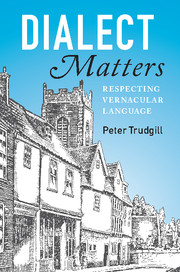Book contents
- Frontmatter
- Dedication
- Epigraph
- Contents
- Foreword
- Acknowledgements
- Map
- Themes
- 1 History: how things came to be this way
- 2 Prescriptivism and other useless pastimes
- 3 Language change: observing and accepting it
- 4 What is happening to words?
- 5 Languages and dialects in contact and conflict
- 6 Respecting English grammar
- 7 Respecting ordinary language
- 8 Sounds and fury
- 9 Respecting local speech
- 10 Grammar: the wonder of it all
- 11 More about words
- 12 Origins
- 13 Accent rules
- 14 Respecting names
- Postscript
- Index
10 - Grammar: the wonder of it all
Published online by Cambridge University Press: 05 August 2016
- Frontmatter
- Dedication
- Epigraph
- Contents
- Foreword
- Acknowledgements
- Map
- Themes
- 1 History: how things came to be this way
- 2 Prescriptivism and other useless pastimes
- 3 Language change: observing and accepting it
- 4 What is happening to words?
- 5 Languages and dialects in contact and conflict
- 6 Respecting English grammar
- 7 Respecting ordinary language
- 8 Sounds and fury
- 9 Respecting local speech
- 10 Grammar: the wonder of it all
- 11 More about words
- 12 Origins
- 13 Accent rules
- 14 Respecting names
- Postscript
- Index
Summary
This section continues the discussion of grammar, but concentrates more on grammatical processes and categories, and how they differ between different language varieties.
What is your evidence?
What a pity that some people in this country think that grammar is something to get worried or indignant about. Grammar is a magnificent and exciting and wonderful thing. To see it reduced to the mundane level of letters to the press complaining that people say sat rather than sitting is depressing, as is Mr Gove testing our children by instructing them to “Complete the sentence below using either I or me: My team and ____ are playing next week.” Obviously he thinks the “correct” answer is I, which I agree is not wrong; but it is certainly not so common in that context as the equally correct me.
All languages and dialects have their own special grammars. Over the millennia, human minds and societies have produced a range of amazing grammatical phenomena. I wonder if Mr Gove knows that many languages have two different pronouns corresponding to English we? This is very sensible, because we is ambiguous. If I tell you that “We've got great tickets for Carrow Road for Saturday”, you might get excited until it turns out that the “we” is me and my wife, and not me and you. (Mr Gove would mark me wrong for that last sentence.)
And what about verbs? English verbs are not particularly interesting. If you start from the basic form move, you can use the grammatical endings we call morphemes to produce the forms moving, moved and moves (except in Norfolk, where we don't even trouble ourselves about the latter). And that's it.
But in other languages there are verb morphemes which do all sorts of fascinating things. In the Californian language Pomo, there is a grammatical prefix f- which means ‘with the side of a long object’. It would be rather fun, I think, to be able to say “I fmoved it” in English.
And many languages have morphemes we call evidentials. These are compulsorily attached to verbs to show what your evidence is for saying something. They mean things like ‘I know because someone told me’ or ‘I saw it’ or ‘I assume’.
- Type
- Chapter
- Information
- Dialect MattersRespecting Vernacular Language, pp. 151 - 162Publisher: Cambridge University PressPrint publication year: 2016



